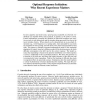Free Online Productivity Tools
i2Speak
i2Symbol
i2OCR
iTex2Img
iWeb2Print
iWeb2Shot
i2Type
iPdf2Split
iPdf2Merge
i2Bopomofo
i2Arabic
i2Style
i2Image
i2PDF
iLatex2Rtf
Sci2ools
105
click to vote
NIPS
2008
2008
Optimal Response Initiation: Why Recent Experience Matters
In most cognitive and motor tasks, speed-accuracy tradeoffs are observed: Individuals can respond slowly and accurately, or quickly yet be prone to errors. Control mechanisms governing the initiation of behavioral responses are sensitive not only to task instructions and the stimulus being processed, but also to the recent stimulus history. When stimuli can be characterized on an easy-hard dimension (e.g., word frequency in a naming task), items preceded by easy trials are responded to more quickly, and with more errors, than items preceded by hard trials. We propose a rationally motivated mathematical model of this sequential adaptation of control, based on a diffusion model of the decision process in which difficulty corresponds to the drift rate for the correct response. The model assumes that responding is based on the posterior distribution over which response is correct, conditioned on the accumulated evidence. We derive this posterior as a function of the drift rate, and show t...
| Added | 30 Oct 2010 |
| Updated | 30 Oct 2010 |
| Type | Conference |
| Year | 2008 |
| Where | NIPS |
| Authors | Matt Jones, Michael C. Mozer, Sachiko Kinoshita |
Comments (0)

